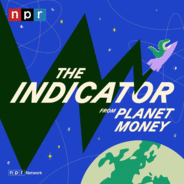Today on the show, we discuss why the IRS is sharing some taxpayer information, why bonds and stocks both fell, and how robots will replace you,or at least most of your chore wheel, in the near future.Related episodes: Why are stocks and bonds both falling? For sponsor-free episodes of The Indicator from Planet Money, subscribe to Planet Money+ via Apple Podcasts or at plus.npr.org. Fact-checking by Sierra Juarez. Music by Drop Electric. Find us: TikTok, Instagram, Facebook, Newsletter. Learn more about sponsor message choices: podcastchoices.com/adchoicesNPR Privacy Policy

Wirtschaft
The Indicator from Planet Money Folgen
A bite-sized show about big ideas. From the people who make Planet Money, The Indicator helps you make sense of what's happening in today's economy. It's a quick hit of insight into money, work, and business. Monday through Friday, in 10 minutes or less.
Folgen von The Indicator from Planet Money
300 Folgen
-
Folge vom 11.04.2025IRS information sharing, bonds bust, and a chorebot future
-
Folge vom 10.04.2025What keeps a Fed president up at night"There's no bad weather, only bad clothing." That's the motto of the Federal Reserve Bank of Chicago, where Austan Goolsbee is president. As economic weather conditions stay unpredictable, Austan tells us how he's gearing up for tariffs, inflation, and more. Related episodes:The Fed cut rates ... now what? (featuring: Sasquatch) (Apple / Spotify)Tariffied! We check in on businesses (Apple / Spotify)A chat with the president of the San Francisco Fed (Apple / Spotify)Is the economy going stag(flation)?For sponsor-free episodes of The Indicator from Planet Money, subscribe to Planet Money+ via Apple Podcasts or at plus.npr.org.Fact-checking by Sierra Juarez. Music by Drop Electric. Find us: TikTok, Instagram, Facebook, Newsletter. Learn more about sponsor message choices: podcastchoices.com/adchoicesNPR Privacy Policy
-
Folge vom 09.04.2025What happens when an economist becomes prime minister?Today on the show, we meet Canada's new Prime Minister, economist Mark Carney. What's it like when your former job — being a non-political banker who decides a country's interest rate — bleeds into your now-political decisions on everything?Related episodes: A polite message from Canada to the U.S. (Apple / Spotify)Learn more about sponsor message choices: podcastchoices.com/adchoicesNPR Privacy Policy
-
Folge vom 08.04.2025What's so bad about a trade deficit?President Trump claims a main goal of his crippling tariffs is to address the U.S. trade deficit. So is the U.S. trade deficit a problem? On today's show, why we'll never have a trade surplus with every single country; what the benefits of a trade deficit are; and whether or not the trade deficit affects jobs. Related episodes:Tariffied! We check in on businesses (Apple / Spotify) Why there's no referee for the trade war (Apple / Spotify) Common economic myths debunked (Apple / Spotify) For sponsor-free episodes of The Indicator from Planet Money, subscribe to Planet Money+ via Apple Podcasts or at plus.npr.org. Fact-checking by Sierra Juarez. Music by Drop Electric. Find us: TikTok, Instagram, Facebook, Newsletter. Learn more about sponsor message choices: podcastchoices.com/adchoicesNPR Privacy Policy
